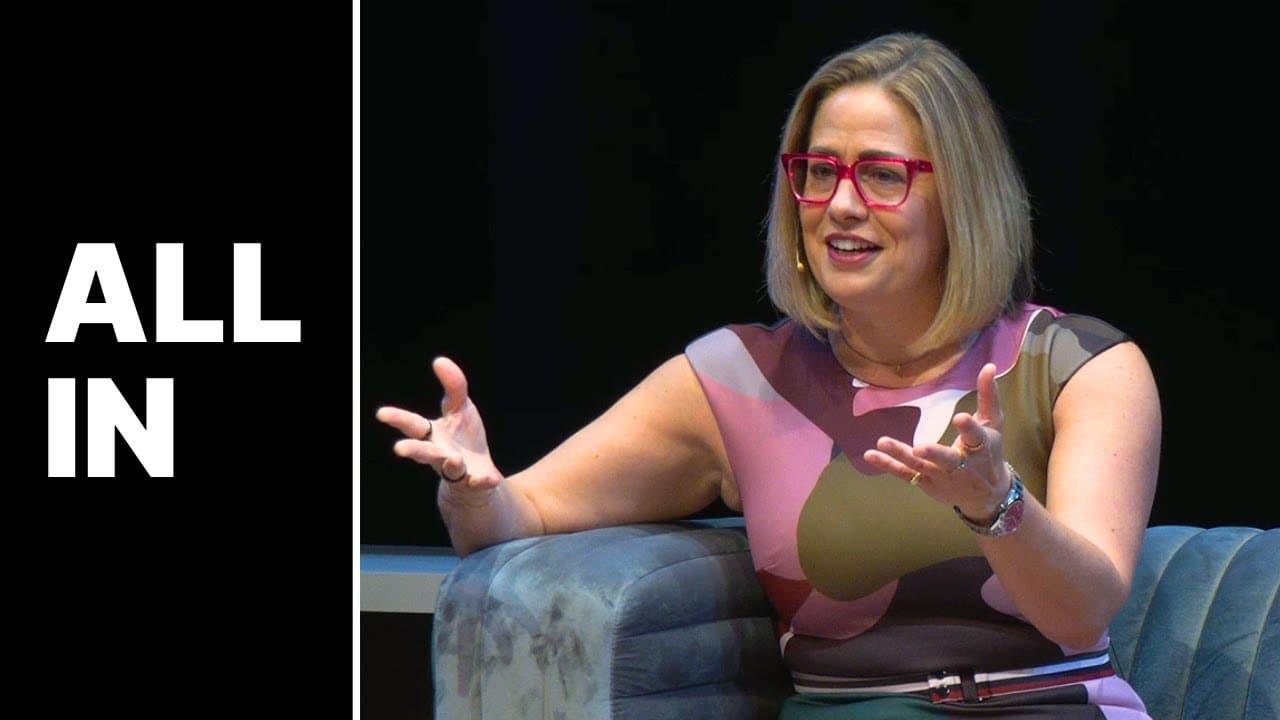Senator Kyrsten Sinema | All-In Summit 2024
25 Sep 2024 (1 year ago)

The Besties welcome Kyrsten Sinema (0s)
- Kyrsten Sinema is the first Democrat to win a Senate seat in Arizona since 1976 and the first woman to serve as a senator in Arizona. (7s)
- Sinema was censured by the Arizona Democratic party and announced she is leaving the Democratic party. (16s)
- It is stated that if you agree with someone 100% of the time, either they are lying or you are not thinking for yourself. (27s)
Thoughts on JD Vance, the importance of bipartisanship, civil disagreements, and independent thinking (54s)
- It is stated that there is a concerning trend in American politics where individuals feel pressured to agree with someone completely or view them as an enemy to be destroyed. (1m31s)
- It is argued that this mindset is dangerous and that a diverse "marketplace of ideas" is preferable, where individuals can learn from differing viewpoints and potentially evolve their own opinions. (1m59s)
- A personal anecdote is shared about a vote in the Senate regarding Israel, where the speaker chose to vote based on their own beliefs rather than following a partisan directive, highlighting their commitment to independent thinking. (5m6s)
Political pressure and growing toxicity in DC, Senator Sinema's controversial filibuster vote (6m21s)
- The filibuster is a rule in the United States Senate that requires 60 senators to approve major legislation, acting as a control mechanism to prevent extreme political swings. (6m54s)
- There is intense political pressure in the Senate to conform to party lines, as exemplified by the pressure surrounding the vote on protecting the filibuster. (6m47s)
- American politics has become increasingly partisan, with a focus on rewarding those who make extreme statements rather than those who prioritize finding common ground and making difficult decisions. (10m3s)
Money in politics, following "The Machine," the cost of a competitive Senate race (12m21s)
- It costs millions of dollars to run for a Senate seat, with a seat in Arizona estimated to cost around 150 million dollars. (12m37s)
- There is pressure to raise money when running for office, and many candidates choose to follow the party line to secure funding. (13m0s)
- Most people want to follow the party line and be a part of the "club," rather than feeling forced to conform to secure their careers. (14m6s)
Behind the scenes of Build Back Better (15m10s)
- The Biden administration's Build Back Better legislation, a $4.5 trillion spending package, failed to pass due to opposition from all Republicans and two Democrats. (15m20s)
- It was suggested that the administration should have consulted with the swing vote senators, Sinema and Manchin, at the beginning of the process to determine their willingness to support the legislation. (16m21s)
- Sinema publicly stated her opposition to the Build Back Better package early on, citing its high cost and irresponsible nature, and engaged with the White House to outline specific tax policies she was willing to consider. (18m31s)
Chances of a viable third party, what's next for Senator Sinema, innovation in the private sector (21m43s)
- A question is posed about the viability of a third political party in the United States, given the current two-party system and the lack of representation many feel. (21m44s)
- It is suggested that fear of the opposing party and their policies prevents many Americans from supporting a third party, despite widespread dissatisfaction with the existing options. (23m0s)
- Private industry is presented as a potential driver of progress and innovation, even in the face of governmental gridlock, with a focus on its role in generating ideas, innovation, and funding for social programs. (24m41s)
Thoughts on Israel/Palestine, antisemitism on college campuses (25m43s)
- Israel is a crucial democratic ally of the United States in the Middle East. (25m59s)
- Antisemitism, although present throughout US history, has been intensifying and becoming increasingly overt, transitioning from hushed discussions to open pronouncements. (26m11s)
- There is a concerning narrative gaining traction, particularly in elite academic institutions, that portrays Israel as the oppressor and Hamas as the liberator, a perspective deemed illogical and dangerous. (26m52s)